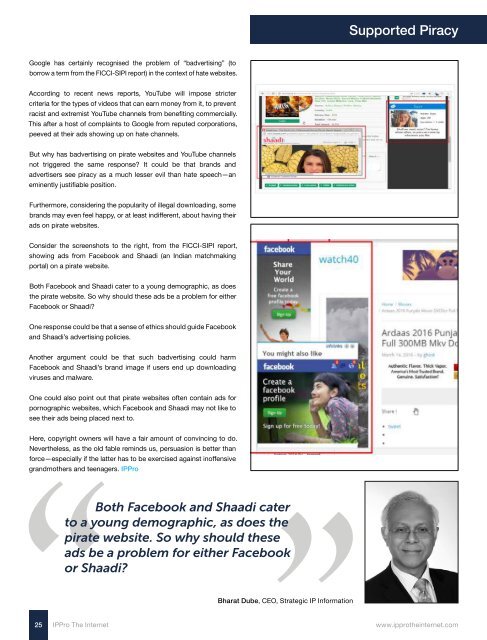IPPro The Internet Issue 140
In this issue Matthew Bassiur, head of IP enforcement at Alibaba, gives an update of the e-commerce company’s enforcement efforts.
In this issue Matthew Bassiur, head of IP enforcement at Alibaba, gives an update of the e-commerce company’s enforcement efforts.
You also want an ePaper? Increase the reach of your titles
YUMPU automatically turns print PDFs into web optimized ePapers that Google loves.
Supported Piracy<br />
Google has certainly recognised the problem of “badvertising” (to<br />
borrow a term from the FICCI-SIPI report) in the context of hate websites.<br />
According to recent news reports, YouTube will impose stricter<br />
criteria for the types of videos that can earn money from it, to prevent<br />
racist and extremist YouTube channels from benefiting commercially.<br />
This after a host of complaints to Google from reputed corporations,<br />
peeved at their ads showing up on hate channels.<br />
But why has badvertising on pirate websites and YouTube channels<br />
not triggered the same response? It could be that brands and<br />
advertisers see piracy as a much lesser evil than hate speech—an<br />
eminently justifiable position.<br />
Furthermore, considering the popularity of illegal downloading, some<br />
brands may even feel happy, or at least indifferent, about having their<br />
ads on pirate websites.<br />
Consider the screenshots to the right, from the FICCI-SIPI report,<br />
showing ads from Facebook and Shaadi (an Indian matchmaking<br />
portal) on a pirate website.<br />
Both Facebook and Shaadi cater to a young demographic, as does<br />
the pirate website. So why should these ads be a problem for either<br />
Facebook or Shaadi?<br />
One response could be that a sense of ethics should guide Facebook<br />
and Shaadi’s advertising policies.<br />
Another argument could be that such badvertising could harm<br />
Facebook and Shaadi’s brand image if users end up downloading<br />
viruses and malware.<br />
One could also point out that pirate websites often contain ads for<br />
pornographic websites, which Facebook and Shaadi may not like to<br />
see their ads being placed next to.<br />
Here, copyright owners will have a fair amount of convincing to do.<br />
Nevertheless, as the old fable reminds us, persuasion is better than<br />
force—especially if the latter has to be exercised against inoffensive<br />
grandmothers and teenagers. <strong>IPPro</strong><br />
Both Facebook and Shaadi cater<br />
to a young demographic, as does the<br />
pirate website. So why should these<br />
ads be a problem for either Facebook<br />
or Shaadi?<br />
Bharat Dube, CEO, Strategic IP Information<br />
25 <strong>IPPro</strong> <strong>The</strong> <strong>Internet</strong> www.ipprotheinternet.com







